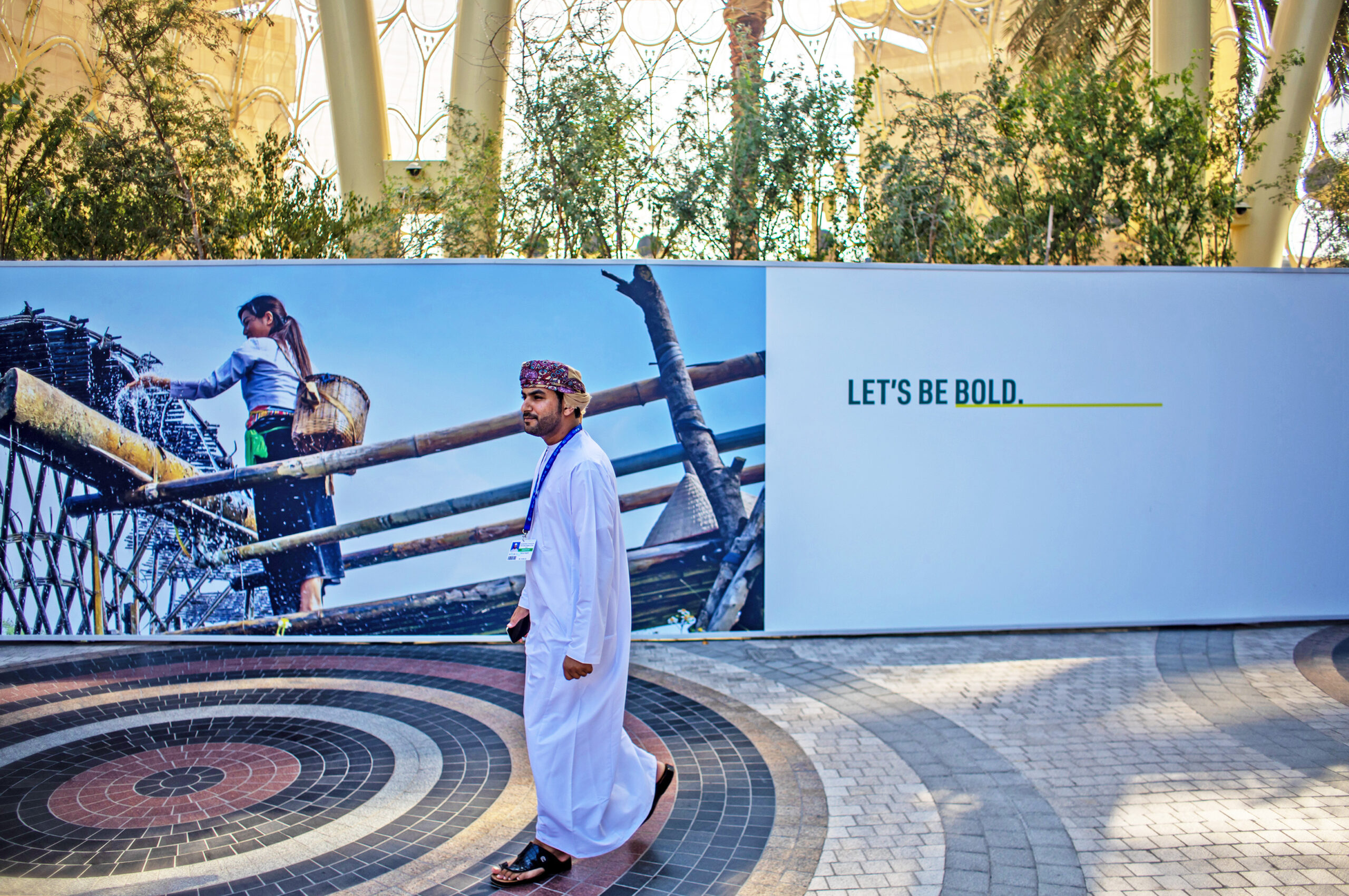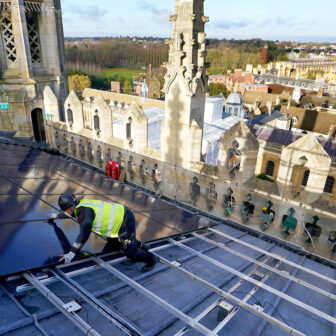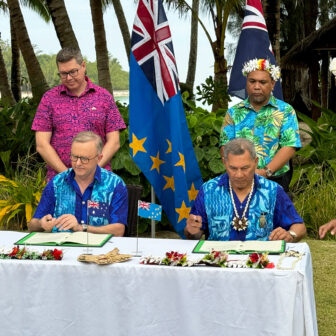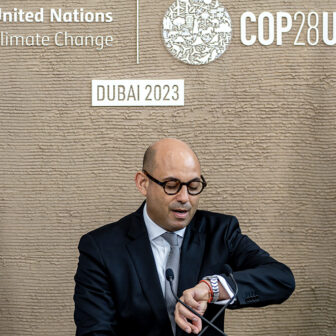How many PR executives does it take, not to change a lightbulb, but to ensure everyone knows that at least 30 per cent of the lightbulb will be powered by renewable or nuclear energy by 2030?
For Edelman, the global public relations company hired by the United Arab Emirates to support its COP28 presidency, the answer is sixty-four. That’s the size of the company’s team at the UN climate conference, now into its second week in Dubai. (Thirty per cent by 2030 is the UAE’s modest new “clean energy” target.) But the host country is taking no chances: it has also hired communications firm BCW, whose COP team is twenty-five-strong. Yet even these eighty-nine communications specialists were not enough to prevent a PR disaster dominating the media coverage of the COP’s first week.
Sultan Al Jaber, the UAE’s controversial choice to chair the conference — his other job is chief executive of the country’s giant oil company ADNOC — was seen in a leaked video denying that climate science required an end to fossil fuels. In a conversation with former Irish president Mary Robinson, as revealed by the Guardian, Al Jaber lost his cool when questioned about the future of the oil and gas industry. “There is no science out there, or no scenario out there,” he said tetchily, “that says that the phase-out of fossil fuel is what’s going to achieve 1.5°C.”
Unfortunately for Al Jaber, plenty of scientific scenarios say exactly that. In its last global assessment report, the Intergovernmental Panel on Climate Change, or IPCC, analysed hundreds of results from economic climate models in which global warming is limited to 1.5°C above preindustrial levels. When they use realistic assumptions about the proportion of carbon that might be captured and stored or removed directly from the atmosphere, they show that on average coal, oil and gas consumption will have to be cut from 2020 levels by 99 per cent, 70 per cent and 84 per cent respectively by 2050.
Al Jaber’s comments attracted immediate criticism from climate scientists. They were “verging on climate denial,” said Bill Hare, veteran Australian IPCC author and COP-watcher. Johan Rockström, director of the Potsdam Institute for Climate Impact Research, acknowledged that a 70 per cent reduction in oil production didn’t mean bringing it to an end altogether, but stressed the importance of clear messaging: “I cannot see scientifically there being any other communication than that we need to phase out fossil fuels.”
Messaging was indeed Al Jaber’s problem, for the central point of contention at COP28 is precisely what language should be used in respect of fossil fuels. “Phasing out” is the demand of the most climate-vulnerable countries, supported by the European Union. “Phasing down” is the weaker alternative preferred by China, India and Saudi Arabia. (John Kerry, the US climate envoy, was trying “largely phased out.”) As the neutral chair of the conference, Al Jaber is meant to be mediating between these positions, not supporting one of them.
This should have been the point at which the PR people earned their fees. Edelman’s website boasts that crisis management is one of its specialities. But either they’re kidding themselves, or Al Jaber didn’t take their advice. In a hastily convened press conference the following day, the COP president put on another ill-tempered show. Flanked by the chair of the IPCC, Professor Jim Skea — looking decidedly uncomfortable — Al Jaber insisted that “we very much believe and respect the science.” But he could not help himself also attacking his critics. “I am quite surprised,” he said, “with the constant and repeated attempts to undermine the work of the COP28 presidency.”
Al Jaber’s ill-judged remarks and thin political skin are the result of not having to face a free media in his own country. They probably won’t derail the final outcome of the conference, where the search is now on for other forms of words (neither phasing out nor down, but another verb altogether) that can reconcile the opposing positions on the future of fossil fuels. But the episode in many ways exemplified the wider problem at this and recent COPs.
The problem is the focus on glossy announcements that satisfy the PR people but often do little to clarify what countries and companies are actually doing to bring down their emissions or support developing countries to become more climate-resilient.
In the first week of the COP the UAE announced no fewer than ten official declarations, pledges and coalitions in which various combinations of countries and companies signed up to various degrees of commitment to action on climate. These covered Agriculture, Food and Climate, endorsed by 146 countries; Climate and Health, 133 countries; Renewables and Energy Efficiency, 128 countries; Climate Relief, Recovery and Peace, seventy-five; Gender-Responsive Just Transitions, seventy-four; Cooling, sixty-six; Hydrogen, thirty-seven; Climate Finance, a disappointing thirteen; along with an Oil and Gas Decarbonisation Charter (fifty-two companies) and a Coalition for High Ambition Multilevel Partnerships pledge (sixty-five countries).
This was not all. Strangely absent from the official website but much vaunted on the day of launch was a Declaration to Triple Nuclear Energy by 2050 endorsed by twenty countries. And alongside all these the UAE has also announced a raft of other new initiatives: a Global Decarbonisation Accelerator, an Industrial Transition Accelerator, a Coal Transition Accelerator (joining the existing Powering Past Coal Alliance), a Global Education Solutions Accelerator, a Net Zero Mobilization Charter, an Innovate for Climate Tech Coalition, a Charter on Finance for Managing Risk, a Net Zero Export Credit Agencies Alliance, a Roadmap for Islamic Sustainable Finance, an African Green Industrialisation Initiative, a Global Electric Cooling Coalition, a Waste to Zero Coalition, a Buildings and Cement Breakthrough, and a Global Youth Statement.
It’s hard to know what to make of all this. It’s clear that for the UAE this welter of announcements has been a major focus of the overall PR effort. Every day four or five new press releases have landed in the inboxes of the 4000 journalists attending the COP, overwhelming them with new pledges, targets, carefully honed quotes from government and business leaders, and triumphant group photos in front of giant declaratory backdrops. The impression given is undoubtedly impressive, a reflection of a busy year of coalition-building and commitment-cajoling by Al Jaber and his team. Yet at the same time it is almost impossible to know how many of these pledges — particularly the government ones — will actually lead to new policies or spending in the countries that have signed up to them.
The nuclear pledge provides a case in point. The press release trumpeted the commitment to tripling nuclear energy capacity. Both France and Britain signed up. But France’s electricity system is 72 per cent nuclear already, so clearly tripling does not mean “in France.” Britain has nine nuclear power stations but has been struggling since 2007 to build a tenth, which is now due to come onstream in 2027. So tripling is not on the cards there either. It turns out that what these countries have signed up to is an aspiration for other countries to triple their nuclear capacity: not quite as much of a commitment as it looked at first sight.
The financial pledges attached to the announcements are even more obscure. The UAE website boasts a dazzling array of new financial pledges announced at COP: a total of US$6.8 billion for energy, US$8.5 billion for lives and livelihoods, US$1.2 billion for inclusion, and a puzzling US$61.8 billion for “finance.” But whether these sums are really new money or a recycling of old commitments is impossible to know. Forensic examination by NGOs has shown that much “climate finance” is only tangentially related to climate, and internationally comparable accounting is woeful. It is doubtful that most of these COP announcements will buck the trend.
Yet wholesale cynicism would also be misplaced. The reason there are so many initiatives in the UAE’s list is that climate mitigation and resilience are needed in every industrial sector, and there are a lot of sectors. What’s been striking at this year’s COP is the much deeper level of engagement of many business representatives than previously.
In the past many business-led events were largely exercises in self-promotion. There’s been a fair amount of that in Dubai, but also many more events and conference sessions genuinely exploring the challenges of decarbonisation and adaptation in different sectors and countries. Green technologies are advancing rapidly — there have been multiple sessions on the potential of artificial intelligence to support climate action — and investors are pouring in money.
In effect there’s been a parallel conference going on here — while the UN negotiators do their increasingly abstruse thing in the formal sessions, the real world has broken in and is taking over the space. It’s messy, it’s not properly accountable, it’s all still largely voluntary rather than regulated. But it reflects a sea change in the scale and seriousness of business action on climate around the world.
All round the COP conference venue the PR people have put up little slogans and homilies to inspire the delegates. “Let’s lead change.” “The urgency of the climate challenge demands courage, not caution.” “Action inspires hope.” Strangely enough, they might be right. •




